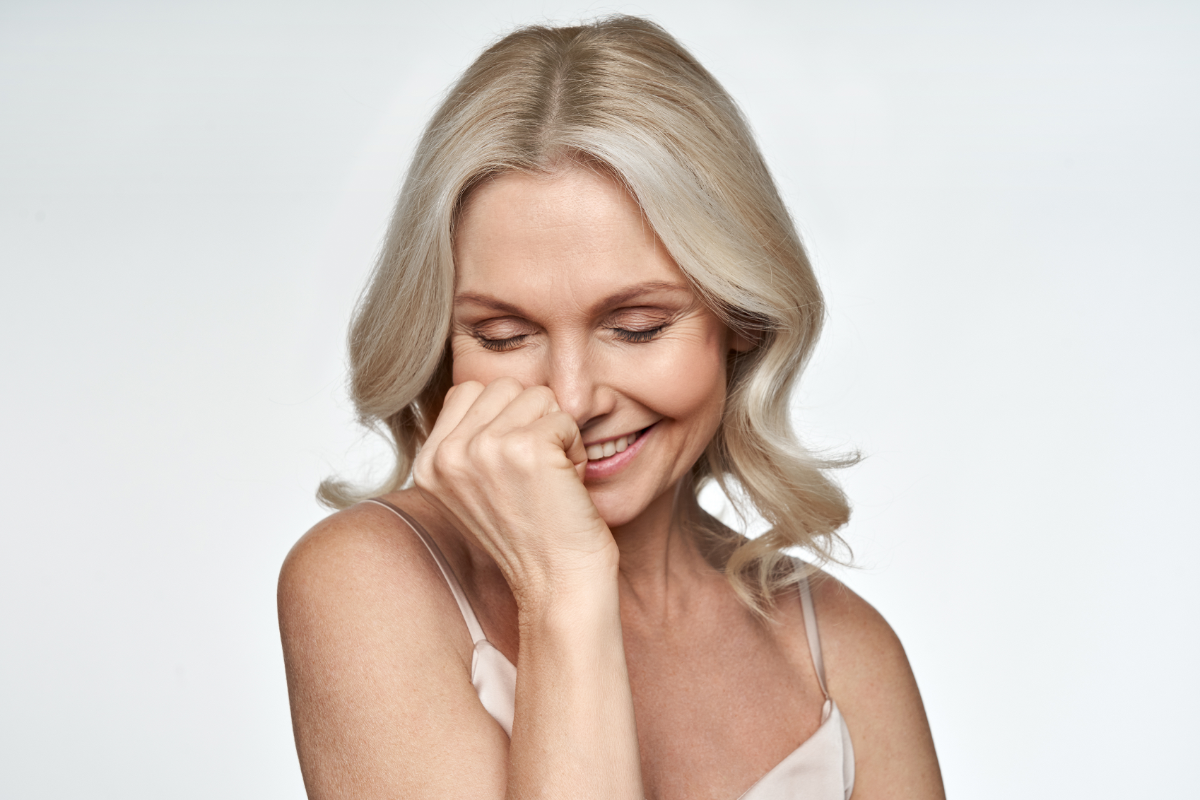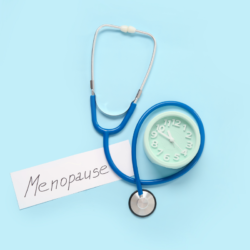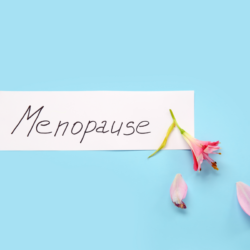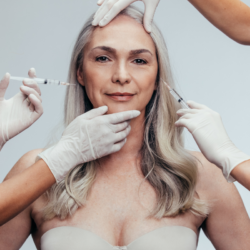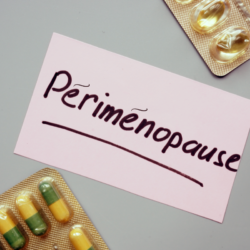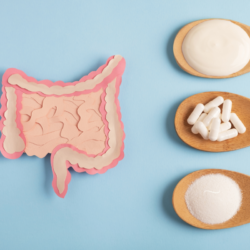The menopause is an unavoidable milestone in a woman’s life, marked by hormonal, physiological and emotional changes. While many focus on symptoms such as hot flushes or weight gain, sexuality during this phase deserves particular attention. This guide aims to take an in-depth look at the challenges and solutions concerning sex life after the menopause.
Hormones and libido: The crucial role of oestrogen
The decline in oestrogen levels is a key feature of the menopause and has direct implications for sexuality. These hormones are responsible for vaginal sensitivity and lubrication. Their decline can lead to vaginal dryness, tissue atrophy and reduced libido.
Vaginal dryness and pain during penetration
- Vaginal dryness: This is one of the most common symptoms and can make sexual intercourse uncomfortable or even painful. An accurate diagnosis via a gynaecological examination can help in choosing the appropriate treatment.
- Pain during interc ourse: Dyspareunia, or pain during intercourse, can be due to vaginal atrophy but also to other conditions such as endometriosis or ovarian cysts.
How can vaginal dryness during the menopause be relieved?
Combating vaginal dryness during the menopause is a crucial issue for many women. This problem is often due to a drop in oestrogen levels. Fortunately, there are several solutions based on scientific research.
- For medical treatment, vaginal oestrogen creams are often recommended. These have been backed up by reliable clinical studies, such as the one published by Freedman, M.A. in “Obstetrics and Gynecology Clinics“.
- If you’re looking for a quick fix water-based or silicone lubricants can provide immediate relief.
- For fans of natural remedies coconut oil is an excellent option. It has received positive reviews in studies such as theJournal of the British Menopause Society.
- Finally, in terms of diet, increasing your intake of omega-3 fatty acids fatty acids could be beneficial. This approach is supported by research, notably that published in theJournal of Medicinal Plant Research.
Boosting sexual pleasure during the menopause
Behavioural approaches, such as communication and sexual techniques, play an essential role in maintaining a satisfying quality of life during the menopause.
Open communication
The menopause often brings with it significant physiological and emotional changes that can affect your sex life. Open and transparent communication with your partner is therefore essential for navigating this transitional period. Studies, such as the one published in‘Sexual and Relationship Therapy’ (Mark, KP. et al., 2018), highlight the importance of communication in improving sexual satisfaction, particularly during the menopause. Openly addressing concerns and needs can help adjust expectations and find mutually satisfying solutions.
Sexual techniques
Adapting sexual techniques and positions can also play a key role in minimising discomfort or pain associated with vaginal dryness or other menopausal symptoms. Positions that allow women to control the depth and angle of penetration, such as the Andromache position, are often recommended. The medical literature, including the Journal of Sexual Medicine (Binik, Y.M., 2010), suggests that such adaptations can significantly increase sexual comfort and pleasure during the menopause.
Kegel exercises
Kegel exercises, which aim to strengthen the pelvic floor muscles, can contribute to better sexual health. These exercises are often recommended to improve urinary control, but they also have positive effects on sexual function. A study published in“The Journal of Sexual Medicine” (Shishido, K. et al., 2017) found that regular practice of Kegel exercises can improve various aspects of sex life, including lubrication and orgasm.
How to deal with low desire during the menopause?
Lack of sexual desire can be a complex problem, particularly during the menopause. Although certain drugs have been developed to stimulate the female libido, the results are mixed and often accompanied by undesirable side effects.
Flibanserin: A controversial drug
Flibanserin, marketed under the name Addyi, is a drug that is supposed to improve libido in women. However, its effectiveness is minimal and it is only prescribed for premenopausal women. Notable side effects include low blood pressure, fainting and nausea.
What can cause a drop in libido?
- Declining hormones: Both oestrogen and testosterone play a role in libido. While oestrogen levels drop significantly during the menopause, testosterone declines more gradually with age.
- Depression: Commonly diagnosed in middle age, depression is a well-known factor in reduced desire. Certain antidepressants such as selective serotonin reuptake inhibitors (SSRIs) can also reduce libido.
- Medication and libido: Some antihypertensive drugs can affect libido. It is important to consult a doctor to find a medication that controls blood pressure without affecting sexual desire.
- Physical illnesses: Treatment for cancer or other serious illnesses can reduce sexual interest.
- Stress and Anxiety: Work and family pressures can put sexuality on the back burner.
- Relationship tensions: Emotional distance from a partner can also be a factor.
How to boost libido and pleasure during the menopause?
The menopause is often associated with hormonal changes that can affect libido. Nevertheless, there are a variety of personalised solutions to tackle these challenges. Here’s an overview of the therapies available and the actions to consider. To address the complexity of the problem of low libido or lack of sexual desire during the menopause, we explore here various strategies, supported by scientific data, aimed at restoring and maintaining a fulfilling sex life.
Examining the relationship and the situation
Assessing the specific factors affecting your libido is fundamental. Whether these are environmental factors such as stress at work, or more personal factors such as problems in the couple‘s relationship, accurate identification is necessary to develop a targeted treatment plan.
Medication
If you are taking medication, such as antidepressants or antihypertensives, a medical re-evaluation may be indicated. Some of these medications have side effects that can have a negative impact on libido. It is essential to consult your healthcare professional to consider alternatives or dosage adjustments. Studies, including one published in the British Journal of Clinical Pharmacology (Clayton, A.H., et al., 2014), confirm the impact of certain drugs on sexual function.
Sex therapy
Sex therapy can offer effective ways of addressing complex and multidimensional issues affecting libido. Such support can include behavioural exercises, therapeutic discussions and even pharmacological interventions. Work by Basson, R. (2006) in the Journal of Sexual Medicine showsa significant improvement in libido using combined therapeutic approaches.
Yoga
Yoga, as a mind-body approach, offers breathing techniques, postures and relaxation methods that have been scientifically proven to improve libido. The study by Dhikav, V. et al, (2010) in “The Journal of Sexual Medicine” is one example that highlights the positive effects of yoga on various aspects of sexual function, including libido.
Sex toys
The use of sex toys, such as vibrators or clitoral stimulators, can be an effective method of enhancing sexual pleasure during the menopause. These mechanical devices can increase stimulation and blood flow to the erogenous regions, contributing to greater arousal and more intense orgasms. Studies published in the Journal of Sexual Medicine (Herbenick, D. et al., 2009 ) have confirmed the effectiveness of vibrators in improving sexual function in post-menopausal women.
Hot/cold gels
Warming gels, often based on ingredients such as menthol, can also be used to enhance sexual pleasure. These gels work by inducing a sensation of heat that can intensify sensitivity and arousal during intercourse. Although less scientifically studied than other interventions, some anecdotal reports and case studies suggest that these products can enhance the sexual experience.
How can sport help balance hormones during the menopause?
Find out how strength exercises can be an effective therapeutic alternative for increasing oestrogen levels and alleviating menopausal symptoms.
The menopause is a period in a woman’s life characterised by the permanent cessation of menstruation, generally between the ages of 45 and 55. This transition leads to a reduction in the production of oestrogen, causing a range of symptoms such as hot flushes, fatigue and urogenital problems. While hormone therapy remains a common treatment option, it can have undesirable side-effects such as an increased risk of breast cancer and cardiovascular problems. In this context, physical exercise, particularly strength training, is emerging as a viable alternative.
Study methodology
A systematic review conducted between 2015 and 2022, published in the Journal of Clinical Medicine, examined the effectiveness of strength exercises in alleviating menopausal symptoms. After selecting 12 articles out of a possible 5964, the study showed significant improvements in various parameters such as muscle strength, physical activity, bone density and hormonal and metabolic levels.
Relevant results
- Leg and pelvic floor muscle strength: Strength exercises showed improvements in leg and pelvic floor strength, which may contribute to a better quality of life.
- Physical activity and bone density: An increase in bone density was observed, which is particularly relevant given that the reduction in oestrogen can lead to a loss of bone mass and, ultimately, osteoporosis.
- Hormonal and Metabolic Changes: Improvements in resting metabolic rate, blood pressure and heart rate were noted.
Recommendations
Although the study does not specify a particular type of strength exercise as being the most effective, it does suggest that various types of exercise produce the same benefits. It is therefore recommended that you consult a health professional to establish an exercise programme tailored to your specific needs and conditions.
FAQ
1. What is the menopause?
The menopause is a period of hormonal transition in a woman’s life, marked by the cessation of menstruation. It is often accompanied by symptoms such as hot flushes and mood swings, and can also affect sex life.
2. At what age does the menopause generally begin?
The menopause generally occurs between the ages of 45 and 55, but this can vary. The onset of the pre-menopausal period, or perimenopause, can begin several years earlier.
3. How does the menopause affect libido?
The menopause can lead to a drop in libido, largely due to the reduction in oestrogen levels.
4. Is vaginal dryness a common symptom of the menopause?
Yes, vaginal dryness is a common symptom and can make sexual intercourse uncomfortable or painful.
5. Are there any treatments for vaginal dryness during the menopause?
Lubricants, vaginal moisturisers and some forms of hormone replacement therapy can be used to treat vaginal dryness.
6. Can the menopause cause emotional problems that affect sex life?
Yes, hormonal changes can contribute to emotional symptoms such as irritability or depression, which in turn can affect sex life.
7. Are hormone treatments safe?
Hormone replacement therapy (HRT) is generally considered safe for most women, but it can have side effects and risks. It is crucial to discuss your particular situation with a healthcare professional.
8. What are the risks associated with HRT?
HRT can increase the risk of certain conditions such as blood clots, heart disease and certain types of cancer. A medical assessment is therefore essential.
9. Are there natural alternatives to HRT?
Yes, options such as phytotherapy can be considered, but it is important to consult a health professional to assess their effectiveness and safety in your specific case.
10. Does the menopause affect all women in the same way?
No, menopausal symptoms and their impact on sex life vary from woman to woman, depending on a number of factors, including pre-existing health conditions and life context.
Source:
- https://www.ncbi.nlm.nih.gov/pmc/articles/PMC5994393/
- https://www.health.harvard.edu/womens-health/yes-you-can-have-better-sex-in-midlife-and-in-the-years-beyond
- https://www.ncbi.nlm.nih.gov/pmc/articles/PMC7678780/
- https://www.mdpi.com/2077-0383/12/2/548#:~:text=5.-,Conclusions,blood%20pressure%20and%20hot%20flashes.
- https://www.ncbi.nlm.nih.gov/pmc/articles/PMC5783135/

